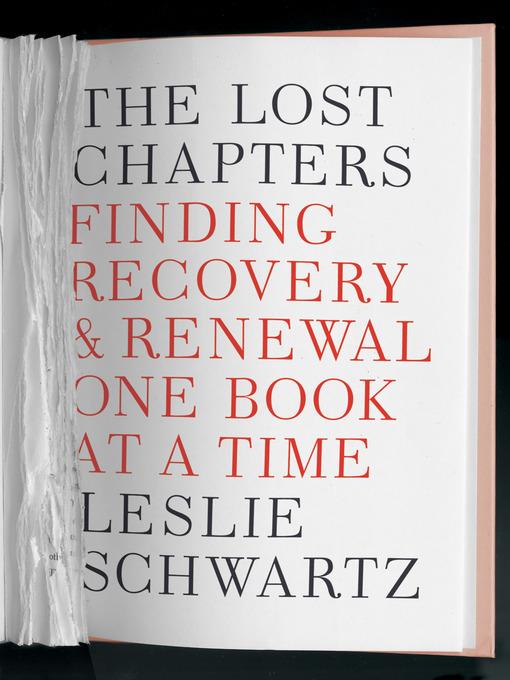
The Lost Chapters
Finding Recovery and Renewal One Book at a Time
کتاب های مرتبط
- اطلاعات
- نقد و بررسی
- دیدگاه کاربران
نقد و بررسی

Starred review from April 30, 2018
Novelist Schwartz (Angels Crest) turns to nonfiction in this reflective account of her brief time behind bars. Following an arrest for driving under the influence (and a dubious charge of battery of an officer), the writing teacher found herself in Los Angeles County Jail, sentenced to 90 days, of which 37 were eventually served. Married and the mother of an adolescent daughter, Schwartz had been sober for 10 years before relapsing into drug and alcohol addiction, and a series of blackouts that culminated in her arrest, imprisonment, and the haunting realization that she had lost entire “chapters” of her life. While in jail, she read (she was allowed to order three books per week) and found inspiration and escape in the writings of Ruth Ozeki (A Tale for the Time Being) and Edith Wharton (Ethan Frome), among many others. She was a middle-aged Jewish woman among primarily black and Latino prisoners, and there she learned to let go of self-blame and shame, and reached out to her cellmates (a 21-year-old prostitute named Wynell, and Qaneak, who killed a cop) with kindness and generosity (for example, by teaching yoga). In return, she found sisterhood, support, and love. The author’s heartfelt story of self-acceptance and redemption will captivate readers with its honesty, vulnerability, and array of memorable characters.

May 1, 2018
An intimate chronicle of the cruel and dehumanizing experience of incarceration.At the age of 53, Schwartz (Angels Crest, 2004, etc.), a fiction writer, essayist, and writing teacher, began a 90-day sentence at a Los Angeles county jail for DUI. By the time she began her term, she had been sober for six months, following a devastating 414-day relapse of drinking and drugs. In "a chronic state of blackout," her writing career tanked; her husband, teenage daughter, and most of her friends left her; twice, she nearly died from an overdose. Arrested four times, mostly for DUI, she crashed two cars and lost her license and most of her money. Ashamed and grateful that she never killed anyone when driving drunk, she was overcome with anger and self-pity despite realizing the pain that her alcoholism had inflicted on those closest to her. "Sometimes I would look at you when you were drunk and wish you were dead," her daughter told her. For Schwartz, incarceration was both "soul crushing" and ultimately liberating. Jail was a leveler, where everyone--prostitutes, addicts, murderers, and women too poor to pay parking tickets--was reduced to a barcoded wristband. In jail, she reflects, "it was impossible to stereotype. Everything I thought I knew about what and who people supposedly were was forever stripped from me." She forged close, empathetic friendships with her cellmates: obese Duckie, who took Schwartz under her wing; "tough, wise Wynell," a prostitute who revealed a life story of poverty, violence, and fear. The author witnessed "the depravity of power" that pervades the criminal justice system. Besides her relationships with her fellow prisoners, she found solace in 22 books--fiction, poetry, and the Big Book of Alcoholics Anonymous--that she read hungrily. From Ruth Ozeki's A Tale for the Time Being, she learned that "change is only possible through self-forgiveness," and "sanity meant I had to stop blaming everyone for the fury of my addiction."An absorbing, emotionally raw memoir.
COPYRIGHT(2018) Kirkus Reviews, ALL RIGHTS RESERVED.

June 1, 2018
Following a yearlong relapse into alcohol and drug addiction, writer and teacher Schwartz was sentenced to 90 days in the L.A. County Jail for DUI with a questionable battery charge. She had been sober for more than a decade but was now thrust into an eye-opening, humiliating, soul-searching experience. Prison forced Schwartz to face painful truths, including the deep hurt she had caused those who loved and supported her. Fortunately, reading helped her transform her difficult situation into a mental- and spiritual-growth process, fostering Schwartz's ability to seek the lost chapters of her story. Schwartz's prison reading ranged from poet Mary Oliver to Buddhist Pema Chodron to novelist Maxine Hong Kingston, along with some classics. Being incarcerated, Schwartz recognized the feeling of time suspended, which she encountered in Ruth Ozeki's A Tale for the Time Being (2013). Reading was respite but also revelation as it alerted Schwartz to who she thought she was while simultaneously awakening her to the substantially greater suffering of her fellow inmates. A true tale of transcendence and an invaluable acknowledgement of the power of reading.(Reprinted with permission of Booklist, copyright 2018, American Library Association.)

February 15, 2018
Novelist Schwartz (Jumping the Green) recalls almost nothing that transpired during a 414-day relapse from sobriety wrought with arrests and rehab, lost friends and lost jobs, and one flashing knife. Sentenced to 90 days for driving under the influence and battery of an officer, she recouped through the stories she read and the stories she heard from other inmates.
Copyright 2018 Library Journal, LLC Used with permission.

























دیدگاه کاربران